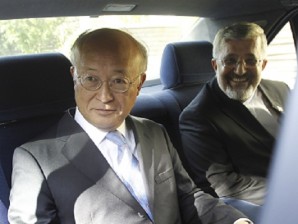
International Atomic Energy Agency (IAEA) chief Yukiya Amano, left, sits in his car as he leaves at the conclusion of his meeting with Iran's top nuclear negotiator, Saeed Jalili, unseen, as Iran's chief delegate to the IAEA Ali Asghar Soltanieh looks on, in Tehran, Iran, Monday, 21, 2012. AP/IRNA,Adel Pazzyar
TEHRAN, Iran — A top Iranian nuclear negotiator said that traces of enriched uranium discovered at an underground bunker came from a “routine technical issue,” the country’s official IRNA news agency reported Saturday.
Ali Asghar Soltanieh, Tehran’s envoy to the International Atomic Energy Agency, was responding to a report by the U.N. nuclear watchdog that said it had found radioactive traces at an Iranian nuclear site. The uranium found had been enriched to a level that is slightly closer to the threshold needed for nuclear weapons than Iran’s previous highest-known enrichment grade.
The IAEA said in the confidential report obtained Friday by The Associated Press that it was asking Tehran for a full explanation about the traces. But the report was careful to avoid any suggestion that Iran was intentionally increasing the level of its uranium enrichment.
Tehran said the find was a technical glitch, according to the report. Analysts and diplomats said Iran’s version sounded plausible.
The West suspects Iran is pursuing a weapons program. Tehran denies the charge, saying its nuclear program is aimed at peaceful purposes like power generation and cancer treatment.
Soltanieh said the report on Iran’s nuclear activities was “historic evidence” that proved the peaceful nature of Iranian nuclear activities, while the uranium discovery was blown out of proportion for political reasons.
“This issue shows that some intend to damage the existing constructive cooperation between Tehran and the International Atomic Energy Agency,” he was quoted as saying.
The higher the enrichment, the easier it becomes to re-enrich uranium to the 90 percent needed for weapons grade. As a result, the finding of traces at 27 percent at the Fordo enrichment plant in central Iran sparked international interest.
Iran denies any plans to develop nuclear weapons, but has for years declined offers of reactor fuel from abroad, including more recent inducements of 20-percent material if it stops producing at that level. The Islamic Republic says it wants to continue producing 20 percent uranium to fuel its research reactor and for medical purposes.
But its refusal to accept foreign offers has increased fears Tehran may want to turn its enrichment activities toward producing such arms. The concerns have been fed by IAEA suspicions that Iran has experimented on components of an atomic arms program — suspicions Tehran also denies.
The report cited a May 9 letter from Iranian officials suggesting any enrichment at 27 percent was inadvertent. The letter said the particles were produced “above the target value” and could have been for “technical reasons beyond the operator’s control.”
But the IAEA report did detail some progress in talks between the U.N. nuclear agency and Iran that the agency hopes will relaunch a long-stalled probe into the suspicions that Tehran has worked on nuclear-weapons related experiments.
Amano will handover the report on Iran’s nuclear activities to the board of directors of the agency later in June.
IRNA also reported that Iran’s nuclear chief, Fereidoun Abbasi, said Saturday that Tehran will not open the Parchin site until the agency convinces the country it is necessary.
“If a visit to Parchin is to happen, they should convince us in advance. So far, no reason and evidence has been handed to us,” Abbas was quoted as saying.
After a short visit to Tehran last week, Amano said Iran and the agency will sign an agreement on inspection to the site, soon.

